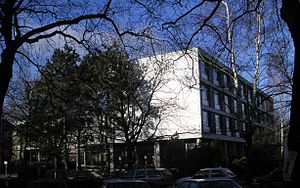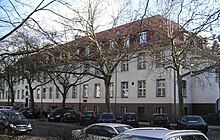Otto Suhr Institute
| Otto Suhr Institute for Political Science - OSI - |
|
|---|---|
 Building view Ihnestr. 21st |
|
| Category: | University institute |
| Carrier: | Free University of Berlin |
| Legal form of the carrier: | Public corporation |
| Facility location: | Berlin |
| Type of research: | applied basic research |
| Subjects: | Political science |
| Basic funding: | State of Berlin |
| Management: | Bernd Ladwig |
| Homepage: | http://www.polsoz.fu-berlin.de/polwiss |
Coordinates: 52 ° 26 ′ 58 ″ N , 13 ° 16 ′ 36 ″ E
The Otto Suhr Institute for Political Science (OSI) is an institute of the Free University of Berlin . It is part of the Department of Political and Social Sciences and the largest political science institution in Germany. It is named after the former governing mayor of Berlin , Otto Suhr (1894–1957, SPD ). Almost 3,500 women and men are studying their first and second degree at the Otto Suhr Institute, of which almost 17% come from abroad.
history
The OSI emerged in 1959 from the German University of Politics , which was founded in 1920 and was part of the Berlin University under the National Socialists as a Faculty of Foreign Studies under the direction of Franz Six (see also Albrecht Haushofer , Harro Schulze-Boysen , Rainer Hildebrandt ) and after the shutdown at the end of World War II was reopened in 1948.
In the 1950s, the OSI stood for a fresh start in political science in Germany. Social democratic and left-wing socialist exiles played a greater role at the reform university FU than would have been possible at the West German full-time universities. Franz L. Neumann , Ernst Fraenkel and Ossip K. Flechtheim played a special role . The second generation included university lecturers such as Johannes Agnoli , who had taught at the OSI as Flechtheim's assistant since 1962 and was later appointed to a professorship.
The Otto Suhr Institute was not just a think tank for socially critical thinking and later also for (left) political activism since the 1968 movement . The years 1967 to 1969 saw a political awakening here as well, during which the students and parts of the mid-level faculty politicized themselves more broadly and in some cases more radically than in previous years, but also than in other comparable institutes in the Federal Republic of that time.
In the course of the international standardization of the courses at the Otto Suhr Institute, the diploma course in Political Science was reformed in 2003 and supplemented by consecutive courses with a Bachelor of Arts and Master of Arts degree in political science. In addition, the Otto Suhr Institute, together with the University of Potsdam and the Humboldt University of Berlin , offers a Master of Arts in International Relations . These structural changes, along with computer-aided monitoring and administration of the course of studies of the student body by the so-called "campus management" software, have been a constant point of contention between students and university management since their introduction. Since the approval of the Collaborative Research Center 700 “Governance in Areas of Limited Statehood” at the Otto Suhr Institute by the German Research Foundation in 2006, some of the students and teachers have been increasingly focusing research and teaching on the political science sub-area of international relations Criticized in favor of political theory and the history of ideas . This development led to fierce disputes over appeal procedures.
Part of the OSI is housed in the building of the former Kaiser Wilhelm Institute for Anthropology, Human Heredity and Eugenics .
The Otto Suhr Institute achieved a position as the most prestigious political science institute in Germany in the 2020 Zeit Ranking .
Research priorities
The most important current research focuses of the Otto Suhr Institute are in the areas of area studies including European politics, international relations, security and environmental research. In addition to a large number of externally funded projects , the special research area “Governance in Areas of Limited Statehood” is located at the OSI.
German-French study programs
- HEC Paris : The integrated course offers twenty students from all over the world the opportunity to complete the Master of Science in Management from HEC and the Master of Public Policy and Management from Freie Universität Berlin within two academic years . In addition, the HEC offers three Otto Suhr Institute students the opportunity to study for a semester in Paris as part of their undergraduate studies.
- Institut d'études politiques de Paris (Sciences Po): As part of the course, students acquire the German-French double bachelor's degree in political and social sciences within four semesters (2 years in Nancy, 2 in Berlin). This integrated course is also available as a Master’s option: in Political and Social Sciences, which combines the Master of Arts in Political Science from the Free University and the Master de Sciences Po with the mentions “Affaires Internationales” or “Affaires Européennes”.
These study programs are recognized by the German-French University (DFH).
Well-known scientists at OSI
Alumni
|
|
|
|
|
|
literature
- David Bebnowski, Foundations of the New Left. Franz L. Neumann and American German networks in West Berlin , in: Magic of Theory - History of the New Left in West Germany, special issue of Work - Movement - History , Issue II / 2018, pp. 23–38.
- Bodo von Greiff , Gerhard Kiersch , Klaus Megerle , The OSI. Science, studies and organization at the Department of Political Science at the Free University of Berlin, Berlin 1989
- Michael Hewener, The Theory of the Extra-Parliamentary Opposition: Johannes Agnolis "Transformation of Democracy in: The Magic of Theory - History of the New Left in West Germany, Special Issue of Work - Movement - History , Issue II / 2018, pp. 39–45.
- Detlef Lehnert: "Politics as Science". Contributions to the institutionalization of a specialist discipline in research and teaching at the German University of Politics (1920–1933). In the Political Quarterly . Vol. 30, No. 3 (September 1989), pp. 443-465.
- Siegfried Mielke (Ed.) With the collaboration of Marion Goers, Stefan Heinz , Matthias Oden, Sebastian Bödecker: Unique - Lecturers, Students and Representatives of the German University of Politics (1920-1933) in the resistance against National Socialism. Berlin 2008, ISBN 978-3-86732-032-0 .
- The President of the Free University of Berlin (Ed.), Research at the Free University of Berlin: Department of Political Science (Otto Suhr Institute) , Berlin 1996: Publication of the Free University of Berlin.
- Britta Herweg, Siegfried Mielke : Otto Suhr as a trade unionist. From workers' education to political science. Patron saint of the OSI , Berlin 1999: Publication of the National and International Trade Union Policy Office of the Free University of Berlin.
Web links
- Otto Suhr Institute for Political Science
- Free University of Berlin
- OSI Club - Association of Friends of the Otto Suhr Institute
- Franco-German University
Individual evidence
- ↑ David Bebnowski, Foundations of the New Left. Franz L. Neumann and American German networks in West Berlin , in: Magic of Theory - History of the New Left in West Germany, special issue of Work - Movement - History , Issue II / 2018, pp. 23–38.
- ↑ Michael Hewener, The Theory of the Extra-Parliamentary Opposition: Johannes Agnolis "Transformation of Democracy in: Magic of Theory - History of the New Left in West Germany, Focus Issue on Work - Movement - History , Issue II / 2018, pp. 39–45.
- ↑ Heike Schmidt: Silent and loud protest . In the taz , December 8, 2005.
- ^ Controversy over political theory at the Otto Suhr Institute . In Der Tagesspiegel , October 30, 2010
- ^ Department of Political and Social Sciences at the Free University of Berlin. Retrieved May 19, 2020 .
- ↑ “Master of Public Policy and Management” course ( memento of the original from November 6, 2010 in the Internet Archive ) Info: The archive link has been inserted automatically and has not yet been checked. Please check the original and archive link according to the instructions and then remove this notice.


